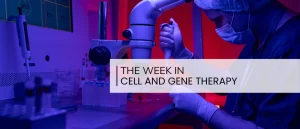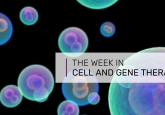Cell therapy weekly: FDA accelerates CGBio’s bone regeneration medical device

This week: The US Food and Drug Administration (FDA; MD, USA) accelerates CGBio’s (Seoul, South Korea) bone regeneration product to market, CollPlant Biotechnologies (Israel) commences preclinical trials for regenerative breast implant and Voyager Therapeutics (MA, USA) and Novartis Pharma AG (Basel, Switzerland) have entered a strategic collaboration to develop a gene therapy candidate for Huntington’s disease.
The news highlights:
- Bone regeneration ‘NOVOSIS PUTTY’ accelerated to the US market by the FDA
- Preclinical trials initiated for regenerative breast implants
- Alleviating Huntington’s disease spurs a strategic collaboration between Voyager Therapeutics and Novartis
Bone regeneration ‘NOVOSIS PUTTY’ accelerated to the US market by the FDA
CGBio’s NOVOSIS PUTTY is an osteoconductive and moldable ceramic-based synthetic scaffold that integrates recombinant human bone morphogenetic protein 2. These properties enable controlled bone regeneration while reducing surrounding soft tissue inflammation.
The FDA has awarded the product a Breakthrough Device Designation, which expedites a product’s development, review and assessment to accelerate patient access.
Hyun Seung Yu, CEO of CGBio, stated: “The breakthrough device designation for NOVOSIS PUTTY is further proof of CGBio’s technological prowess, innovation and potential. With the designation’s emphasis on quickly bringing beneficial products to market, we are committed to helping more patients overcome diseases and return to healthy lives through NOVOSIS PUTTY.”
Preclinical trials initiated for regenerative breast implants
CollPlant Biotechnologies, a regenerative medicine company developing products from non-animal-derived collagen, is undertaking preclinical trials for 3D-bioprinted regenerative breast implants. This preclinical research follows positive results from a preliminary large-animal study whereby implants achieved neovascular networks and mature connective tissue formation.
“We are very happy with the progress of our regenerative breast implants program thus far and the initiation of this important study,” explained CollPlant’s CEO, Yehiel Tal. “CollPlant’s breast implants in development are unique in that they are designed to regenerate breast tissue as well as have inherent safety advantages. This would be paradigm-shifting in a market that has maintained such a large demand yet has seen increasing issues with safety over the last few decades. A primary goal of this study is to obtain data which would then support the optimization of the implant design and apply this design to a pivotal large-animal study that is intended to be the subject of discussions with the FDA.”
Alleviating Huntington’s disease spurs a strategic collaboration between Voyager Therapeutics and Novartis
A strategic collaboration and capsid license agreement has been struck between Voyager Therapuetics and Novartis Pharma AG. The goal of this agreement is to achieve a preclinical gene therapy candidate for Huntington’s disease. Novartis will gain access to Voyager’s TRACER™ capsids through a target-exclusive license.
“We look forward to broadening our work with Voyager to help bring forward novel, high-impact gene therapies with the potential to improve the lives of patients affected by severe neurologic conditions,” commented Fiona Marshall, President of Biomedical Research at Novartis. “We believe Voyager’s TRACER capsids hold promise for enabling next-generation gene therapies for diseases of the central nervous system, aligning well with our deep neuroscience expertise and gene therapy leadership at Novartis.”
You might also like:
 Mobilizing maggot enzymes to heal chronic venous leg ulcers
Mobilizing maggot enzymes to heal chronic venous leg ulcers
Precision BioSciences and iECURE’s gene-editing therapy approved for clinical trial, positive Phase I results for Obsidian Therapeutics’ novel cancer cell therapy and positive Phase I/II results for SolasCure wound healing gel.





